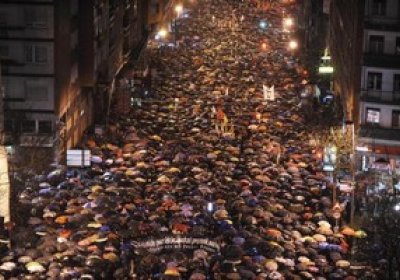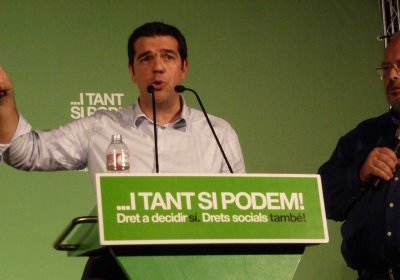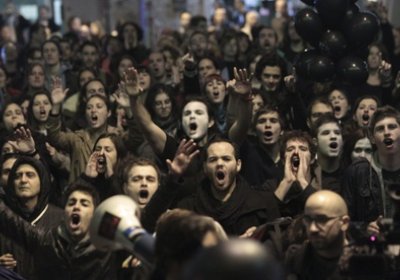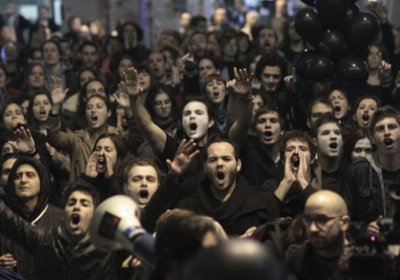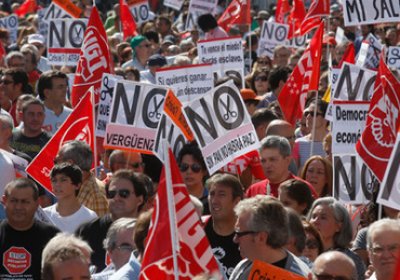A man is sitting in a cell of the Soto del Real prison on the outskirts of Madrid, plotting the downfall of the People’s Party (PP) government of Prime Minister Mariano Rajoy. He is blind with rage and determined to use everything he knows to annihilate Rajoy and his cabinet.
The man is not a left-wing activist. He is a former senator and national treasurer of the party whose leaders he now loathes. His name is Luis Barcenas, known in PP inner circles as “Luis the Arsehole”. He has accumulated up to €48 million in Swiss, Uruguayan and other bank accounts.
Spain
The latest opinion polls in the Spanish state have stirred concern in the elites, hopes on the left and storms of comment in the media.
Nationally, they show the radical federation United Left (IU) closing the gap on the social-democratic Spanish Socialist Workers Party (PSOE). In the June Metroscopia poll, IU trailed just 4.7% behind the PSOE (16.8% to 21.5%).
Regionally, Spanish social democracy’s decline is most advanced in Catalonia and Galicia. In Madrid city council IU would jump from 10.7% to 20.5% of the vote, just 1.6% behind the PSOE.
Jose Maria Aznar, Spain’s messianically neoliberal former prime minister, announced during a television interview on May 21 that he was ready again to serve his country.
“I will act in accordance with my responsibility, my conscience, my party and my country, regardless of consequences, have no doubt about that”, intoned the Popular Party (PP) leader who took Spain to war in Iraq. Aznar was defeated in the 2004 national election after claiming that the Madrid train bombing was the work of Basque Homeland and Freedom (ETA).
The citizens of the Spanish state awoke on April 14 to shocking news ― acts of “pure Nazism” were spreading across the country.
Not only that, but they were being organised in concert with “elements close to ETA” (the armed Basque independence group that has declared a permanent ceasefire).
Who was responsible? A Spanish equivalent of the Greek neo-Nazi outfit Golden Dawn? Some surviving cell of the Falange (one-time shock troops of the Franco dictatorship and admirers of Hitler’s New Order in Europe)?
Nearly 10 years after the Spanish high court outlawed previous Basque left nationalist political groups, the movement has finally given birth to a new legal party ― Sortu (“to create” or “to be born” in Basque).
The new arrival is a powerful force for Basque independence and progressive politics in the Spanish state ― socialist, feminist, ecologically aware and staunchly internationalist.
Jesus Posada, the right-wing People’s Party (PP) speaker of the national Spanish Congress of Deputies, received a delegation on February 12 presenting a People’s Legislative Initiative (ILP). The initiative had the support of more than 1.4 million signatories, 900,000 more than required by law.
Political tensions within the Spanish state have reached a new pitch after the January 23 declaration by the Catalan parliament of Catalonia’s sovereign right to decide its political future.
Antagonism is intensifying between the Catalan and national governments and polarisation continues to rise among and within all main political forces.
Politics in the Spanish state is a Rubik’s cube where all players must mark out their position on the axis of the rights of its nationalities, as well as class struggle and social justice.
All-out warfare on both fronts marked the final week of the campaign for the November 25 elections for the Catalan parliament, as the nine parties with a chance of winning representation in its 135-seat chamber traded blows.
The European Day of Action and Solidarity involved a 24-hour general strike in Portugal and Spain, partial strikes in Italy, Greece, Belgium, Cyprus and Malta, and protests in 16 other European countries on November 14.
Despite the main action being confined to the Iberian peninsula, the day was a big success, with 40 union confederations and individual unions involved.
A general strike was launched across Europe on November 14 as millions are protesting spending cuts and tax hikes they say have deepened the region’s economic crisis. Spanish and Portuguese workers are coordinating their strike with work stoppages underway in Greece, Italy, France and Belgium.
On the morning of October 22, the day after parliamentary elections in the Basque and Galician autonomous communities of the Spanish state, the TV and radio political pundits were struggling to be wise.
Their powers of analysis were not tested so much by the rise of EH Bildu, the Basque left-nationalist coalition — the polls had predicted its 25% vote. The disorienting new phenomenon was result for the Galician Left Alternative (AGE).
Not predicted
The economic, social and territorial crisis facing the Spanish state is morphing into a crisis of the two-party system that has provided either Popular Party (PP) or Spanish Socialist Workers Party (PSOE) governments for 30 years.
Those who have been gaining electorally are Basque, Catalan and Galician nationalist forces (left and right), and the United Left (IU) and Union, Progress and Democracy (UpyD).
- Previous page
- Page 16
- Next page



